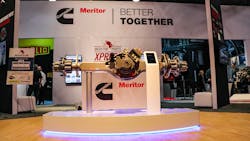GRAPEVINE, Texas—Cummins completed its acquisition of Meritor last August and has now revealed how the manufacturer of brakes, axles, and other vital commercial vehicle components will fit into the larger overall company structure.
Cummins has five operating segments: engine, power systems, components, distribution, and new power, with Cummins' new Meritor business unit sliding into the components segment. The Meritor brand will remain as before, and for customers, nothing will appear different.
Behind the scenes, though, Cummins and Meritor are figuring out how to merge the best of the companies to better serve fleets, OEMs, and distributors—and find efficiencies to bring products to market faster and with improved support.
“The tools that the broader Cummins brings, married to what Meritor has, is helping us do those things,” said Alan Rabadi, general manager of global aftermarket and business development for Cummins-Meritor, at Heavy Duty Aftermarket Week 2023.
See also: Cummins is finding more than one way to decarbonize fleets
The Meritor brand can also now leverage the manufacturing and supply scale and intellectual property that comes with joining Cummins.
“We’ll have a lot of value creation,” said Joe Mejaly, VP of aftermarket at Meritor. “Meritor was a $4 billion company; now we are housed inside of a $24 billion company. The assets and the IP that Cummins brings to us—it would have taken us years to get to that."
Rabadi noted the deal would be mutually beneficial for Cummins customers.
"This acquisition allows us to enhance our position in the existing commercial vehicle marketplace,” Rabadi said. “Cummins is well established in the core engine technology space with our complimentary technologies and products. Meritor expands that by adding on driveline, axle, brake, and related components. We now have a much broader portfolio that we can serve customers with. But we’re also able to pull on the strengths that both companies have."
The tagline for Cummins' newly formed Meritor business unit is “better together.” Rabadi explained that this tagline has been both the internal and external message of the integration.
“The customers will win,” Rabadi emphasized. From a technological standpoint, Cummins-Meritor feels as though the core products offered today have the opportunity to have a better integration and technology development experience. And, moving toward zero-emission technologies, the business unit can offer advancements for customers as well.
New power and the path to zero emissions
Cummins has made significant investments over the past several years in developing the company’s pathway to zero emissions, Rabadi explained. Cummins' focus is on batteries, fuel cells, and related technologies, while Meritor’s focus remains on independent development in their e-powertrains and related technologies.
See also: Cummins' Meritor closes on acquisition of Siemens' Commercial Vehicle business
Meritor also fits into the long-term vision of the new power business segment, Rabadi explained. The new power segment continues to invest in batteries, fuel cells, and other technologies critical for the future, but such investments do not provide short-term returns for the company. “We understand we need to invest ahead of demand,” he noted. “We have to take short-term losses to enable the long-term transition to the market. Meritor and our products, and now the combination [of the two] is going to help us achieve that.”
Cummins’ strategy, destination zero, is a stated objective to get to a zero-emission product lineup by 2050. Rabadi said this is going to take a combination of technologies to achieve.
“We see a roadmap to zero emissions,” he said. “But before you get to the end state, you’ve got the phases in between where we will still need to invest in diesel technology, natural gas technology, and other bridge technologies before you get there."
This article originally appeared on Fleet Maintenance.
About the Author
Tyler Fussner
Assistant Editor | Vehicle Repair Group
Tyler Fussner is a former assistant editor for Endeavor Business Media's Commercial Vehicle Group, including FleetOwner and Fleet Maintenance.
